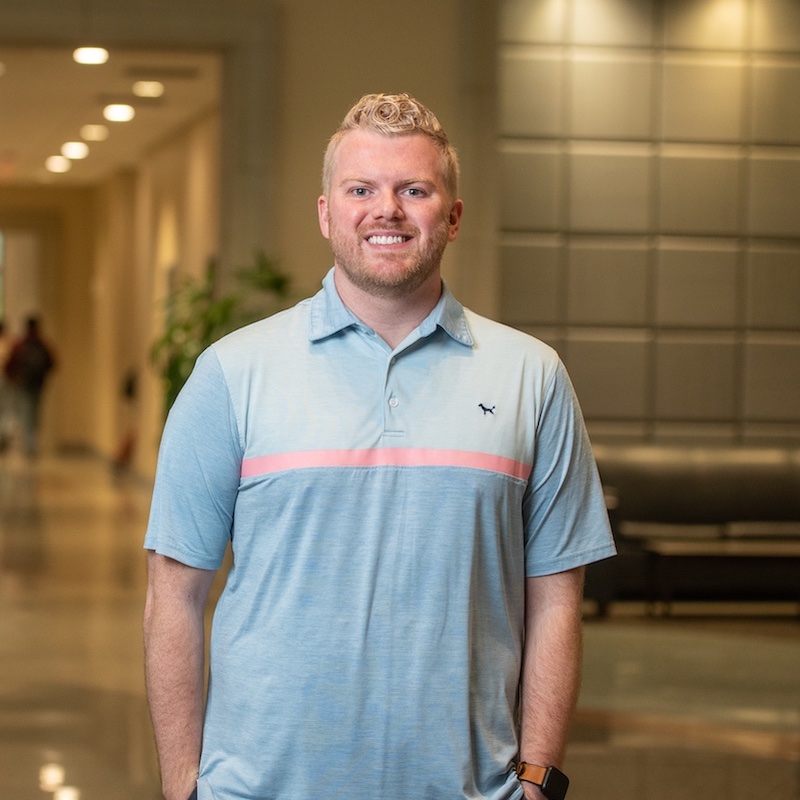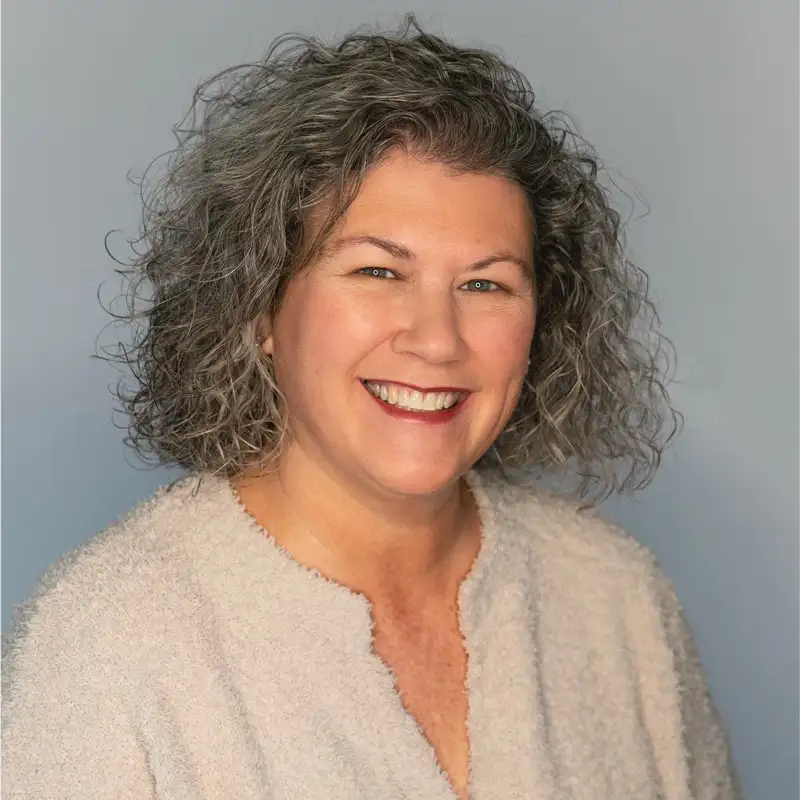Why Get a Master of Arts in Teaching?
Belmont University's Master of Arts in Teaching program is specially designed for those who are interested in moving their career focus toward teaching. Our pathways (Traditional Student Teaching, Residencies, Internship and Job-Embedded) provides flexibility for working professionals as you pursue your degree without having to leave your job or relocate. All pathways lead toward teacher certification and licensure in the State of Tennessee.
Our program offers:
- Complete your MAT on your schedule through our online platform
- $825 per credit hour with additional discounts available for Belmont alumni
- Regular faculty mentorship ensures you stay connected and supported throughout your journey to licensure
- Join a vibrant network of future educators while maintaining the flexibility your career demands
Licensure areas:
- Early Childhood Education with Integrated Special Education (Pre-K-3)
- ESL PreK-12
- Elementary K-5
- Secondary 6-12: Licensure available in the following areas: Biology, Chemistry, English, French, German, History, Latin, Mathematics, Physics, Government (Political Science) and Spanish (or with an undergraduate degree in the subject you want to teach)
- 9-12: Licensure available in Psychology and Sociology for Job-Embedded or Add-on Endorsement only
- Special Education Interventionist (K-8)
Note: All MAT programs are fully online and MAT, Job-Embedded, Elementary and Secondary Education (only) are fully asynchronous.
Available Pathways
The Student Teaching Pathway is a flexible course-based program culminating in a student teaching experience. The required professional core classes are offered during the day and evenings and the methods courses are offered in the evenings. This program can be started in fall, spring or summer semester and takes about two years to complete.
Internship is a year-long internship experience across two diverse settings under the guidance of licensed experience teachers. The intern program entails being school based during the day (following the school district’s schedule) and attending classes in the evening. With this structure, candidates graduate with a Master of Arts in Teaching (MAT) and Tennessee teaching license once the internship year, course requirements and licensure requirements are complete. The internship portion of the program runs from fall to spring only, and candidates must have completed the professional core courses before entering the internship part of the program.
Residency is a paid internship experience as an Instructional Aide in one school under the guidance of a licensed experienced teacher. This program is ideal for someone who is interested in teaching in a high need area (Math, Science, English, Elementary Education and English as a Second Language). The intensive program may be completed in as little as one calendar year and requires evening coursework while working in a school alongside an experienced mentor teacher. Required professional core classes begin in the summer. Residency placements are available through a partnership with Metro Nashville Public Schools and other surrounding school districts.
Job Embedded prepares and supports high-quality teacher candidates who serve as full-time classroom teachers while pursuing licensure and a MAT degree. Coursework is offered in the evenings and is online. A summer start is recommended for this program, and it can be completed in as little as a year and a half.
What You'll Learn
- Gain an understanding of individual differences and diverse cultures and communities to ensure inclusive learning environments enable each learner to meet high standards.
- Create learning experiences that make the central concepts, tool of inquiry and structures of the discipline accessible and meaningful for learners to assure mastery of the content.
- Develop multiple methods of assessment to engage learners in their own growth, to monitor learner progress and to guide the teacher’s and learner’s decision making.
- Plan instruction that supports every student in meeting rigorous learning goals by drawing upon knowledge of content areas, curriculum, cross-disciplinary skills and pedagogy, as well as knowledge of learners and the community context.
Program Details
Education Core Courses: 12 Hours
- EDU 5605 Advanced Study of Lifespan Growth, Development and Disability
This course focuses on the principles and developmental theories of human growth and development. Typical physical, cognitive and psychosocial development across the lifespan is addressed from prenatal to older adulthood with a corresponding focus on how disability impacts passage through each life phase. The course emphasizes developmentally and culturally appropriate educational practice while also addressing application for the unique needs of persons with disabilities from birth through the age of 22 at each level of development. This course also contains approximately 20 hours of field experience.
- EDU 5630 Leadership in Communication and Collaboration in Special Education
This course provides content and practice in the skills required to effectively engage as a professional member and leader of a multidisciplinary educational team. Course topics address theory, research and high leverage practices to support culturally-appropriate family/professional partnerships to maximize beneficial outcomes for students with disabilities. This course also focuses on ethics, equity, and family and professional rights and responsibilities grounded in family-centered, culturally responsive, advocacy and strength-based perspectives. This course also contains approximately 20 hours of field experience.
- EDU 5660 Advanced Study of Instructional Practice in Special Education
This methods course focuses on learning principles and high-leverage instructional practices with corresponding for the academic success of students with mild/moderate disabilities in the least restrictive environment. Course content addresses Universal Design, explicit instruction, differentiation, accommodations and other best practices to support access to the general curriculum in a variety of educational settings. This course also contains approximately 20 hours of field experience.
- EDU 5800 Meeting the Needs of Diverse Learners in the Classroom
Overview of exceptionalities; introduction to pedagogical, curricular and social considerations involved in educating diverse learners in the classroom. Expansion of pedagogical overview to include research and dissemination focused on the identification and implementation of evidenced-based practices. The course has a practicum component.
Belmont Teacher Education candidates have many opportunities to practice their advocacy, leadership and teaching skills through participation in Belmont’s service-learning and volunteer opportunities as well as education department-specific opportunities.
Candidates should explore coaching, teaching and tutoring opportunities, as well as create their own opportunities as they engage in service in their new home community of Nashville.
Our community partners include area charter, independent and public schools, as well as nonprofit and for profit community agencies serving Nashville’s families. Belmont University requires all students to be engaged in community and service-learning opportunities but it is not uncommon for teacher education candidates to go beyond the required hours and in a number of opportunities take leadership roles.
Below are some of the opportunities in which our candidates engage:
Belmont’s Service-Learning and Volunteer Opportunities
Through Get Connected, Belmont’s online volunteer service directory, our candidates can connect with more than 70 area organizations where they can connect and serve. Our teacher candidates take seriously the opportunity to serve the greater-Nashville community and volunteer in programs such as: English Language Tutors with the Tennessee Immigrant and Refugee Rights Coalition, athletic coaches with area middle schools, tutoring programs with the YMCA, Martha O’Bryan Center and area faith-based programs.
Best Buddies©
BESTBUDDIES® builds one-to-one friendships between people with and without intellectual and developmental disabilities (IDD), through school and community friendship programs that provide socialization opportunities to help erase the invisible line that often separates students or adults with and without IDD. Best Buddies at Belmont is an active student organization where Belmont students and community members with IDD become friends and hang out together with the focus on reducing barriers and building inclusive communities focused on strengths and relationships.
Homework Hotline
Homework Hotline is the largest provider of tutoring in Tennessee, the only service available by phone, and the only program that provides tutoring in six languages. Belmont University candidates serve as a volunteer satellite of Homework Hotline, housed on the Belmont campus. In this way, Belmont University students practice teaching techniques while providing one-on-one tutoring to at-risk children.
Kappa Delta Pi National Education Society
Kappa Delta Pi (KDP), International Honor Society in Education, fosters excellence in education and promotes fellowship among those dedicated to teaching. Belmont’s Nu Phi Chapter is additionally, concerned with assisting the community and has been involved with food drives, raising funds for local literacy programs, as well as helping with Homework Hotline.
Student Teacher Education Association
Through its affiliation with the Tennessee Education Association (TEA) and the National Education Association (NEA), our student program leads tomorrow's teachers to a bright professional future. STEA exists to help our members move smoothly from student on campus to beginning teacher. This is achieved through a variety of avenues including organization meetings with speakers who highlight opportunities at Belmont and beyond to broaden understanding of what it means to be an educator, discussion of issues and trends in education, conference attendance for members to network and develop professionally, and a focus on service to communities and families.
STEA is proud to work with Belmont University for Annual Family Literacy Day each spring by forming a reading circle where we read aloud books around a theme with children from the community. We also collect canned goods for local food banks as well as school supplies for teachers and children in Nashville Public Schools. Each spring we also host a campus-wide Valentine’s Day card-making event for the children and families of the Ronald McDonald House and residents of local nursing homes.
Application Priority Dates
Those applying by priority dates will be given first priority in placements. Qualified applicants will continue to be accepted after priority dates.
|
Fall: August 1 |
|
Spring: November 15 |
|
Summer: May 1 |
Admissions Checklist
- Application Form: Apply Online using the BU4U application portal.
- Application Fee: A $50 non-refundable application fee is required.
- Official Transcripts: Request official transcripts from all previous colleges. You may request official hard copies to be mailed, or they may be sent using a secure third party electronic service, if your institution participates (i.e. parchment, student clearinghouse, etc.). Please allow 4-6 weeks for all official transcripts to be received and processed. Official hard copies should be mailed to Belmont University, Office of Admissions, 1900 Belmont Blvd., Nashville, TN 37212. Electronic copies should be sent to belmontadmissions@belmont.edu. An undergraduate GPA of at least 2.75 is required for admission into the Master of Arts in Teaching program.
- Please note that we only accept up to 6 applicable credit hours of graduate work.
- Recommendations: Contact two individuals for professional recommendations. These may be completed after the application fee has been submitted, and are listed under the Supplemental Items section. Recommendations are done entirely through the BU4U portal through email.
- Resume: A professional resume is required and is uploaded through your BU4U portal as a supplemental item.
Application Status
Applicants are admitted on a rolling admissions pattern and will be notified of the admissions committee's decision shortly after the admissions requirements are completed. To check on the status of your application, check your BU4U portal.
Tuition & Financial Aid Information
You can determine the cost per semester for courses in the Master of Arts in Teaching program by visiting the Graduate Tuition & Aid website.
After being offered admission to Belmont, you may secure your enrollment with a nonrefundable enrollment deposit of $150. This deposit will be applied to first semester charges.
Questions?
Contact Hallie Caddy, if you have questions or need assistance.Due to visa and Social Security Number requirements, at this time international students cannot be considered for admission in the College of Education graduate programs.
Candidates without an SSN:
State of TN law prohibits state agencies from issuing professional licenses to individuals who are not eligible to work in the US. Aside from a few specific exceptions, all individuals eligible to work in the US are given an SSN. Therefore, the department is unable to process any licensure transactions for candidates without an SSN.
Belmont University is accredited by the Southern Association of Colleges and Schools Commission on Colleges (SACSCOC) to baccalaureate, master’s and doctoral degrees. Questions about the accreditation of Belmont University may be directed in writing to the Southern Association of Colleges and Schools Commission on Colleges at 1866 Southern Lane, Decatur, GA 30033-4097, by calling (404) 679-4500, or by using information available on SACSCOC’s website (www.sacscoc.org).
Belmont’s Teacher Education Program is approved by the Tennessee Department of Education and accredited by the Council for the Accreditation of Educator Preparation (CAEP) legacy site visit of 2021.
Click here for full accreditation, licensure and annual reporting information

Chris Dickerson
Bachelor of Arts in Sociology with Education minor, Master of Arts in Teaching
Kindergarten Teacher, Metro Nashville Public Schools
"The College of Education really helped me develop both the skills and confidence to begin my teaching career. From teaching quick small group lessons in Literacy I&II to practicing Tier 2 interventions in Classroom Management, I felt like I had the knowledge base to go into the field."

Mary Beth Carroll
Master of Arts (MA), Elementary Education and Teaching
Teacher, Lipscomb Elementary School
“I did my homework in choosing the best MAT program for my needs, and having chosen Belmont, I couldn’t be happier with my preparation for the classroom. I had excellent professors who were able to share both theory and practice, having been in the classroom themselves. The internship program placed me with classroom teachers for an entire year, allowing me to gain valuable firsthand experience. The opportunity to meet regularly with my fellow interns to practice teaching strategies, discuss our education coursework and compare hands-on classroom experiences allowed for deeper understanding of the modern classroom and the differentiated instruction we will be expected to provide in our own classrooms. I am proud of my experiences at Belmont and know my coursework and internship teaching experience prepared me to step into the demands of today’s classroom.”
Frequently Asked Questions About Belmont's Master of Arts in Teaching
Tuition for Belmont's Master of Arts in Teaching program is $825 per credit hour. Belmont alumni qualify for an additional tuition discount. Financial aid, scholarships, and payment plans are available to help make your teaching degree affordable.
Yes, you can complete the MAT program online. All MAT programs at Belmont are fully online. The Job-Embedded, Elementary, and Secondary Education pathways offer additional flexibility through asynchronous coursework, meaning you can complete assignments when it best fits your schedule while still maintaining regular faculty interaction.
Program length varies based on your chosen pathway and schedule. Most students complete the program in 18-24 months. Your academic advisor will help create a timeline that aligns with your goals and commitments.
Belmont's MAT program prepares you for Tennessee teaching licensure in several areas including:
- Elementary Education (K-5)
- Secondary Education (6-12) in subjects like Biology, Chemistry, English, Mathematics, and History
- ESL (PreK-12)
- Special Education Interventionist (K-8)
- Psychology and Sociology (9-12, Job-Embedded or Add-on Endorsement only)
No prior teaching experience is required. Our program is designed for career changers and those new to education. Each pathway provides appropriate field experience and mentorship to prepare you for the classroom.
Online courses combine interactive case studies, faculty-led discussions, and collaborative projects with fellow students. You'll receive regular faculty check-ins and mentorship while building a professional network with other future teachers. The program emphasizes practical application of teaching concepts through real-world scenarios.
Yes, our Job-Embedded and Residency pathways are designed with working professionals in mind. The online format and multiple pathway options allow you to balance your current commitments while pursuing your teaching degree. Many students successfully complete the program while maintaining full-time employment as Teacher of Record.
You'll receive comprehensive support including:
- Regular faculty mentorship and check-ins
- Access to a professional learning community
- Technical support for online learning
- Career services and job placement assistance
- Guidance through the licensure process
Yes, Belmont's College of Education programs are fully accredited by the Council for the Accreditation of Educator Preparation (CAEP) and approved by the Tennessee State Board of Education.
Start your application online through Belmont's graduate admissions portal. For personalized guidance through the application process, contact us at collegeofeducation@belmont.edu or 615-460-5505.
Request Information
Contact Us
Hallie Caddy
Admissions Coordinator
615.460.5505
Email Hallie

